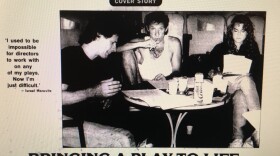
Rhaina Cohen
Rhaina Cohen is a producer and editor for NPR's Enterprise Storytelling unit, working across Embedded, Invisibilia, and Rough Translation.
Previously, she was a producer for Hidden Brain, where she brought together narrative journalism and social science research. Some of the most rewarding stories she worked on include those about why the #MeToo movement took off when it did, how American masculinity makes it harder for men to build close friendships and why we sometimes make decisions that baffle us. Cohen joined NPR as an intern for Planet Money.
She periodically writes for outlets such as The Atlantic, The Washington Post, and The New Republic. Her article about people who make a friend their life partner was selected by Longreads as one of the best articles of 2020. She received some of her earliest journalism training as a research assistant for authors. She worked on the New York Times bestselling book All The Single Ladies: Unmarried Women and the Rise of an Independent Nation and the biography Michelle Obama: A Life.
Cohen was a Marshall Scholar at Oxford, where she earned a master's in comparative social policy (and while there, competed in a dance style that hasn't yet taken off in the United States: acrobatic rock 'n' roll). She holds a bachelor's degree in American Studies from Northwestern University. As a 2018 FASPE fellow, she studied journalism ethics in Germany and Poland.
-
There's an event we were all invited to the day we were born. Attendance is mandatory. But we'd rather not think about it. On this week's radio show, the lengths we go to to avoid thoughts of death.
-
Social media sites offer quick and easy ways to share ideas, crack jokes, find old friends. But the things we post don't go away. We explore how one teenager's social media posts destroyed an opportunity he'd worked for all his life.
-
Should reporters think of their readers and listeners as consumers, or as citizens? This week on Hidden Brain, we explore this tension at the heart of journalism.
-
This week on the Hidden Brain radio show, decision-making. We learn why we often stumble when trying to make ourselves happy, and why certain decisions leave us wondering "what if?"
-
Does living with animals really make us healthier? Why do we eat some animals and keep others as pets? This week on Hidden Brain, we talk with psychology professor Hal Herzog about the contradictions embedded in our relationships with animals.
-
We know our actions affect those around us. But how do we know whether our impact is positive? This week on Hidden Brain, what it means to do good in the world.
-
Decades ago, a group of women accused a prominent playwright of sexual misconduct. For the most part, the complaints went nowhere. In 2017, more women came forward. This time, people listened.
-
This week on the Hidden Brain radio show, we explore how the constantly evolving nature of languages can give us different ways of understanding ourselves as well as the world we live in.
-
So often we get stuck in the past, rehashing what we should have done, and what we no longer have. But researchers say our obsession with the past can tell us something important about our future.
-
Many parents think they can shape their child into a particular kind of adult. Psychologist Alison Gopnik says the science suggests otherwise.










